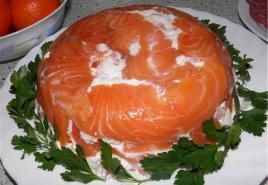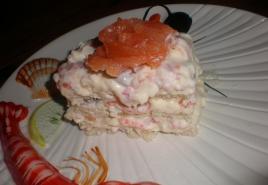Why is sodium benzoate dangerous for humans? Food additive E211. What is preservative E211
In this article I will talk about a popular preservative soft drinks- sodium benzoate, and will also dispel some myths about its dangers.
Sodium benzoate is a salt of benzoic acid and a widely used preservative. It is designated as E211. Is this preservative dangerous? The short answer is no, unless it is abused by the manufacturer. It can only be truly dangerous when drinking drinks that contain both sodium benzoate (E211) and artificial colors, such as:
- E110 (Sunset Yellow)
- E104 (Quinoline yellow)
- E122 (Karmazin - red)
- E129 (Red Charming AC)
- E102 (Tartrazine - golden yellow)
- E124 (Ponceau 4R - crimson).
If a drink contains a combination of sodium benzoate and one of the dyes above, feel free to discard such a drink. In most cases, artificial dyes themselves are carcinogens. But the main danger, according to the report of the British Food Additives Agency (FSA) dated September 6, 2007, is that the combination of sodium benzoate and artificial coloring is reliably associated with an increase in hyperactivity in children, impairs their learning ability, children become inattentive and restless . The author of the report, Professor James Stevenson from the University of Southampton, does not recommend consuming drinks that contain a combination of such “Eshek”, but he believes that in addition to this problem, many other harmful factors are involved in hyperactivity and deterioration of intelligence.
Sodium benzoate itself in the concentrations used for preservation is not dangerous, although you should not overuse products with it either. For some reason, it has somehow become ingrained in people’s minds that any ingredient with index E is very harmful and you should avoid ANY products containing them. This picture, which I found on the Internet, beautifully refutes such prejudices:

By the way, the picture does not indicate that the apple also contains sodium benzoate. And in general, this preservative is often present in “gifts of nature”. Nature itself has taken care to protect itself from mold and yeast. This is the benefit of E211 - it protects products from fungi; and fungi, as we know, can be very harmful - yellow mold can produce aflatoxin - a deadly poison that, even in small doses, has a powerful carcinogenic effect on the liver. In addition, sodium benzoate prevents fermentation of foods. And although yeast (the “culprit” of fermentation) is harmless to the body, who wants to drink bad champagne instead of delicious soda?
Some manufacturers use so-called gentle preservation - this type of soda has a shorter shelf life, but is harmless to the body. I will conclude with advice for buyers: if a soft drink does not contain artificial colors, buy it. And if it is indicated that the product is made using gentle preservation, then this will be an additional argument in favor of choosing such a drink.
Often, when you look at the composition of products purchased in a supermarket, you can see the additive E211. What is hidden under this designation, what are the dangers of its regular use? This and much more will be discussed today.
The incomprehensible alphanumeric designation E211 usually refers to sodium benzoate, which is essentially the sodium salt of benzoic acid. It appears as a white, odorless powder. This food additive increases the shelf life of drinks and food, due to the fact that it is able to suppress the vital activity of molds and yeasts. In microbial cells, E211 inhibits the activity of enzymes responsible for redox reactions, as well as those enzymes that break down fats and starch.
Sodium benzoate is most commonly found in mayonnaise, ketchup, margarine, jam, confectionery, canned fish and caviar, marmalade, fruit pastes, soft drinks and alcoholic drinks with an alcohol content of less than 15%, meat products. This preservative is also included in some natural products, including in small dosages it is found in prunes, cranberries, cinnamon, cloves, and apples. Due to its antibacterial properties, E211 is used in pharmaceuticals and in the production of cosmetics and hygiene products, including gels, shampoos and toothpastes.
Despite the fact that this preservative is not prohibited for use in Russia and Europe, it is negative impact They have been talking about the body for a long time and not without reason.
When interacting with ascorbic acid(the same one healthy vitamin C) sodium benzoate forms benzene. If you believe the research of British scientist Peter Piper, this compound can cause destructive DNA damage in mitochondria, which can trigger the development of a number of serious diseases, including liver cirrhosis, neurodegenerative diseases and even Parkinson's disease, as well as many others.
Regular consumption of sodium benzoate may cause side effects. The worst thing is that nausea and vomiting are just “flowers”, because often this supplement can cause the development of leukemia (blood cancer) and anemia (lack of hemoglobin in the blood).
Currently, there is quite a lot of controversy about the fact that E211 causes hyperactivity in children.
In addition to what is indicated, sodium benzoate can provoke an exacerbation of diseases such as urticaria and asthma.
Often provokes E211 and an allergic reaction.
Agree, dear visitors of our portal, E211 is not as harmless as many people think. Therefore, if you want to maintain health, youth and beauty for long years, then carefully study the composition of the foods you eat and minimize the consumption of all kinds of additives.
Nutritional supplements surround modern man from all sides. Preservatives, emulsifiers and colorings are a common component of the average product on the shelf in grocery store. The preservative sodium benzoate (E211) is one of them.
Learning the facts about sodium benzoate will allow you to more accurately assess its positive and negative effects. And it is the E211 that will be discussed in the article.
Sodium salt of benzoic acid is a white coarse crystalline powder or granules, tasteless and odorless or with a slight bitter aroma.
The compound was obtained by the American scientist Hugo Fleck in 1875 during the reaction of benzoic acid and sodium hydroxide.
Used as a dietary supplement since 1908.
IN natural form found in raisins, prunes, cranberries, apples, cloves.
Useful properties of the preservative
Obviously, E211 exhibits preservative properties, having an inhibitory effect on various molds, yeasts, bacteria, as well as enzymes in their cells that participate in redox reactions and the processes of breaking down starch and fats.
In fact, sodium benzoate is similar in action to an antibiotic, as it inhibits the activity of bacteria. Potassium sorbate E202 (potassium salt of sorbic acid) can enhance these properties.
Due to its properties, sodium benzoate preserves the freshness, healthfulness and taste of food products, ensuring their safety during the specified shelf life.
It is found everywhere in the food industry.
Since this supplement is aimed at suppressing microorganisms and other microscopic flora and fauna, it is not entirely correct to talk about its direct benefits for the human body. However, in fairness, it is worth noting that sodium benzoate can still have a positive effect on a person.
Some of his useful properties are:
Increased memory and enhanced cognitive abilities;
Increased growth factors in the brain;
Reducing cholesterol - the effect is the same as that of statins;
Reduced inflammation levels.
Some of these properties are described in more detail below.
Some studies suggest that sodium benzoate exhibits anti-inflammatory effects and may help treat autoimmune diseases. Although these studies are not as promising, they show that potassium sorbate and sodium sulfite can suppress Th1 type immune responses that have anti-inflammatory effects. Interestingly, sodium benzoate also lowers cholesterol in the same way that statins do, by inhibiting an enzyme called 3-hydroxy-3-methylglutaryl coenzyme A reductase. This is how it has an anti-inflammatory effect.
Sodium benzoate inhibits nitric oxide synthase by inhibiting nuclear factors kappa-bi (the dysregulation of which causes inflammation and autoimmune diseases, as well as a number of other disorders). Inhibiting nitric oxide synthase also reduces the amount of nitric oxide, which has many downstream domino effects.
All of these mechanisms have quite a lot in common with “anti-inflammatory” herbs. For example, bioavailable curcumin and tea reduce inflammation by the same mechanism.
By increasing the number of regulatory T cells, the immune system begins to transfer its own tissue and reverse the process of autoimmune diseases.
Disadvantages and harms of sodium benzoate
It should be understood that for people with chronic diseases, consuming sodium benzoate may not be the best idea. In other matters, this also applies completely healthy person. There are some side effects associated with excess consumption of sodium benzoate in food.
The main danger that E211 poses to humans is its ability to damage parts of DNA. This means that if you consume sodium benzoate today, you will harm future generations tomorrow.
When combined with ascorbic acid (vitamin C, E300), sodium benzoate can form benzene, a particularly toxic substance that is also known to be a carcinogen and a DNA destroyer. As a result, cell mutations and cancer also occur.
Additional side effects may result from the combination of sodium phenylacetate and E211, including chest pain, severe headache, fainting, slow heartbeat, blurred vision, numbness, drowsiness, and slurred speech. In rare cases, taking sodium benzoate and sodium phenylacetate may cause more serious side effects including severe bruising, blood in stool or urine, vomiting, difficulty breathing, loss of consciousness.
It is not recommended to consume foods and drinks that contain sodium benzoate during pregnancy. There have been no human studies, but animal studies indicate adverse effects on the fetus.
Sodium benzoate can also provoke allergic reactions when the immune system reacts to a foreign substance. Some people may experience mild symptoms, which include: localized itching, coughing, redness, rash, swelling or constipation. These symptoms usually begin to appear within minutes to several hours after ingesting foods that contain sodium benzoate.
As already noted, this compound, when combined with ascorbic acid, is transformed into benzene, which, according to research, causes certain types of cancer. Also, sodium benzoate can accumulate in the body, which in itself is dangerous, especially for children.
How to detect sodium benzoate?
The presence of this substance in a food product is usually indicated on the label. First of all, E211 is added to acidic products to enhance and preserve their taste and quality. It can be found in pickles, sauces, mayonnaise, jam or fruit juices. Products that contain vinegar, such as salad dressings, usually have increased content sodium benzoate.
Benzene, a precursor to sodium benzoate, can be found in very rare large quantities, naturally occurring in some fruits, vegetables, meats, dairy products and even drinking water. Sodium benzoate is also often added to without alcoholic drinks, sweet waters, etc., due to the demand for high fructose corn syrup.
Sodium benzoate increases the acidity of soft drinks, which also increases the flavor intensity of the corn syrup-derived drink.
Pay attention to the composition of the product you buy in the store in order to detect E211 in time and avoid its excessive use.
E211 is a common type of preservative for foods, beverages and condiments. And, although benzene is a dangerous carcinogen, in our time sodium benzoate is generally considered safe. A small amount of this probably won't kill you, but it's still best to eat healthy and stay away from additives.
Sodium benzoate (Sodium Benzoate, E-211) is a compound of benzoic acid. Sodium benzoate registered as a food additive with code E-211. Widely used in the food industry as a preservative. At increased doses is a strong carcinogen.
Chemical formula of sodium benzoate NaC 6 H 5 CO 2
Use and effects of sodium benzoate on the body
Sodium benzoate has antibiotic and color enhancer properties. Found in barbecue sauces, preserves, soy sauces, “fruit” dragees, lollipops, etc. Causes allergic reactions. The harmful properties are enhanced in combination with E-102 (tartrazine). Prohibited for use in some countries. Permitted in the CIS countries and Europe. In European countries they are discussing Negative influence combinations of sodium benzoate and artificial dyes on the behavior and intelligence of children, and it is recommended to gradually withdraw dyes E-110, E-104, E-122, E-129, E-102, E-124 from use.
By reacting with ascorbic acid (vitamin C, supplement E-300), sodium benzoate can form benzene, which is a strong carcinogen. According to research by British scientist Peter Piper, a professor at the University of Sheffield, such a compound can cause detrimental damage to DNA in mitochondria, which can cause a number of serious diseases, such as neurodegenerative diseases, cirrhosis of the liver, Parkinson’s disease, etc. The issue of influence of the additive E-211 on children's hyperactivity. Research in this area was carried out by the UK Food Standards Agency in 2007. Now a row foreign companies food manufacturers are looking for alternative replacements food additives E-211.
Sodium benzoate as a preservative
Sodium benzoate has a strong inhibitory effect on yeast and mold fungi, including aflatoxin-forming fungi, suppresses in microbial cells the activity of enzymes responsible for redox reactions, as well as enzymes that break down fats and starch (the same effect sodium benzoate produces on the cells of the human body).
Thanks to its antibacterial properties sodium benzoate found application in pharmaceuticals and the production of cosmetics and hygiene products, such as shampoos, gels, toothpastes. It is also used in the aviation industry to protect galvanized coatings and aluminum parts. Applicable sodium benzoate and in fireworks, to produce a sound effect.
Possible side effects
Sodium benzoate can damage an important region of DNA in mitochondria and cause severe DNA damage in general. There are many diseases that are associated specifically with damage to this part of the DNA - Parkinson's disease, cirrhosis of the liver and a number of neurodegenerative diseases.
Other
Most common dietary supplement E-211 found in the following products: mayonnaise, ketchup, margarine, jam, confectionery, canned fish and caviar, marmalade, fruit pastes, non-alcoholic beer and alcoholic drinks with an alcohol content of 15% or less, soft drinks, meat products.
Most of the food products that are presented on supermarket shelves today contain one or another synthetic additive. One of the most common is E211 or sodium benzoate. It is widely used in both food and other industries, and has maintained its popularity for more than a hundred years. However, this does not mean its safety - there is a lot of controversy surrounding the supplement. Scientists continue to study the properties of the preservative E211 - why it is harmful and how it interacts with other substances.
All about the food additive E211
What is preservative E211?
The additive designated by code E211 is a preservative, most often completely synthetic. Its production requires benzoic acid. This substance is present in some varieties of fruits and berries, as well as other natural products. However, on a production scale it is much easier to synthesize it artificially, which is what happens in most cases.
Sodium benzoate is primarily a preservative. This means that it increases the shelf life of the products to which it has been added. This happens by suppressing the activity of fungi and other microorganisms. Thus, the food additive E211 allows you to keep food fresh and suitable for consumption for a long time. Therefore, it is not surprising that it is so popular among many manufacturers. In addition, sodium benzoate also improves appearance products, making their color more intense and attractive.
Application of sodium benzoate in the food industry
Having examined the labels of various products with long shelf life, you will find on most of them information about the addition of the preservative E211. Most often it is used in the production of mayonnaise, ketchup and other sauces, candies, marmalade, preserves, preserves and preserves, fish preserves, canned salads, low-alcohol and non-alcoholic drinks, nectars, juices, etc.
Since the E211 additive has antibacterial properties, it is used not only in the food industry, but also in the pharmaceutical industry. This component is added to some medications.
In addition, it is also used in the production of shower gels and shampoos, toothpastes, as well as other cosmetic and personal care products.
used in common food products, in some cases it can be harmful to the bodyHarmful effects of E211 on human health
Preservative E211 is approved for use in most countries, including Russia, the European Union and the United States of America. It would seem that this should indicate her safety. However, this is not the case. Of course, E211 is useful for most food manufacturers. It greatly facilitates the process of selling products, reducing losses, because the goods can be stored in the warehouse for quite a long time. But Scientific research There is increasing evidence that sodium benzoate is not a safe additive.
General information about the dangers of sodium benzoate
Mainly, sodium benzoate is toxic when consumed in large quantities. Its harmful effects affect primarily the functioning of the liver and kidneys. It also increases the risk of developing cancer. A dosage of no more than 825 mg per 1 kg of body weight per day is considered safe.
Some scientists are convinced that constant consumption of products containing the E211 additive can lead to cirrhosis of the liver, DNA damage and damage to nerve cells. The latter is the cause of many serious diseases. Many of them develop gradually and enter the active stage only with age, depriving a person of the opportunity to lead an active lifestyle, making him dependent on medications.
Harm of E211 for certain groups of people
Sodium benzoate is especially harmful for allergy sufferers and patients with pulmonary diseases, especially bronchial asthma. Eating this additive may cause severe choking or cause allergic reactions.
If present in the diet of a pregnant woman large quantity products containing E211, there may be a delay in the development of brain cells in the fetus, which after birth affects mental abilities. There is also inhibition of the activity of nerve cells during intrauterine development. Subsequently, this manifests itself in the child’s hyperactive behavior.
Interaction of E211 with other additives
Sodium benzoate enters into an active chemical reaction with some synthetic dyes (E102, E104, E122, E124, E129). When they interact, everything harmful properties E211 are intensified, especially in relation to the child’s body. Thus, there are disturbances in work nervous system, decreased intellectual abilities, hyper-reactivity in behavior and psychological problems.
When the preservative interacts with ascorbic acid (it can be designated as additive E300), benzene is formed. This substance is a strong carcinogen that can accumulate in the body, disrupting the functioning of various internal organs and systems.
As you can see, the preservative E211 can hardly be called a harmless additive. Although scientists currently make recommendations regarding a safe dose, it is almost impossible for the average consumer to calculate it. In addition, it is important to avoid simultaneous use of sodium benzoate with the dyes listed above and ascorbic acid. Pregnant women, allergy sufferers and people with pulmonary diseases should be especially careful. To protect yourself and your children, study the ingredients of products before purchasing and try to minimize the use of E211 preservative.






